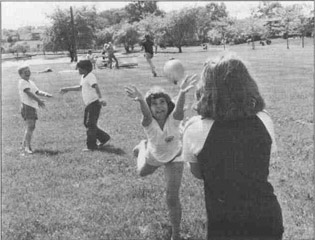|
What Makes A Day Camp
Successful?
by
Matthew Ellman
All across Illinois, park districts and recreation
departments are offering summer day camp programs. These day camp programs provide children
from preschool-age through teens an opportunity for
wholesome recreation. But what are the ingredients that guide
these camps and make them successful?
According to the American Camping Association, camping
provides a creative, educational experience in a cooperative
group living environment in the out-of-doors. It utilizes the
resources of the natural surroundings to contribute significantly
to mental, physical, social and spiritual growth. It is a sustained
experience under the supervision of trained leadership.
The American Camping Association definition of camping
is based on years of education and experience. It gives camps a
prescription from which to work. However, relying on the
Association's philosophy as the only reference does not assure a
successful camp. The making of a truly prosperous camp
program stems from the development of a particular philosophy,
defined set of goals and comprehensive objectives.
The philosophy is a framework of principles, or values, that
constitutes the general purpose of the agency itself. Moreover,
the philosophy should reflect a positive view of the importance
of wholesome leisure and constructive recreation in modem
society. A camp philosophy is a tool that the camp's administration will utilize in everything from hiring staff, training, programming activities and disciplining campers. A day camp that
has not developed a philosophy has no foundation on which to
base all else.
The Westmont Park District Day Camp program philosophy
is to provide an educational and recreational experience in which
campers can express themselves, learn to cooperatively play with
others and function within a group. The philosophy provides
purpose for the staff during the nine week period they are
employed. From the first staff interview to the final day of camp,
the philosophy is reiterated time and time again. Without that as
a guide, the staff may be counter-productive to the camp and its
overall mission.
Once the philosophy of the camp is determined, the goals can
be formulated. To set goals is to chart the direction that the camp
will follow over the course of the summer. Keep in mind that the
goals need to directly relate to the philosophy of the camp and the
operating mission of the agency. Goals are working tools for the
staff. Don't get caught up in developing too many goals and don't
make them too specific. They are meant to be general guidelines
for the staff to follow.
Some examples that directly relate to the Westmont Park
District Day Camp program include providing each camper with
the opportunity for fun and adventure in a safe and supervised
program; encouraging the development of the campers' physical,
mental and emotional skills which contribute to a positive leisure
attitude; and inspiring a sense of social understanding and
responsibility in the campers within a group of peers.
These goals give the camp a purpose. The staff can take these
goals and design their day-to-day activities around them. The
goals give the camp unity. These goals are formulated during the
most critical time — staff training.
Probably the most important element of a successful day
camp program is found in staff training. In some situations, more
time and energy is spent on planning and conducting staff
training than the camp itself. A well-trained staff will require less
Illinois Parks and Recreation 20 July/August 1991
intervention from the camp administration; thus management
personnel can spend more time on day-to-day operations than on
re-directing and disciplining staff.
Your staff will need time to become familiar with and gain
mutual respect for one another.
Westmont Park District's
training program begins with
two-day retreat that everyone
is required to attend. During
the two-day retreat, considerable
time and emphasis is
spent on activities that foster
friendships. It is true that this
process requires some financial
commitment from the
agency, yet the alternative
could be staff conflict and resentment
during the summer.
Once your staff has a better
understanding and appreciation for one another, they can
then focus on the development
and implementation of objectives.
Objectives are the direct
means for achieving goals.
They need to be specific in nature, unlike the goals themselves.
An objective should specify the task the learner is confronted
with, and the action the learner should take. A teamwork oriented
camp will result when objectives are mutually developed and
determined by the entire staff. Utilize all the resources at your
disposal in both the development and implementation of your
objectives.

Day campers enjoy many activities including this water
balloon tossing contest.
|
Programming noncompetitive activities into the campers'
daily schedule will expose them to values which will nourish
teamwork and socialization. This
objective gives the camp counselor a reference point from which
to plan and implement specific
activities. Playing with the parachute for example will present
more than just a fun experience
for the campers. It equally enhances the group socialization
process. Once the staff has developed objectives, the programming of daily activities will have
meaning and focus.
By developing a philosophy,
goals and objectives to meet those
goals, you will be creating a solid
foundation on which your entire
camp can operate. With proper
training and teamwork, you will
be able to count on the support of
the agency and the camp staff
you've hired. And most of all,
you'll be on the way to providing a successful day camp program.
|
About the Author
Matthew Ellman is Recreation and Marketing Coordinator
for Westmont Park District.
Illinois Parks and Recreation 21 July/August 1991
|